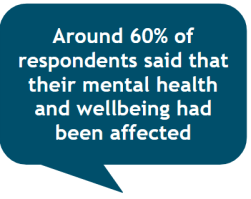Nearly two-thirds of Croydon residents surveyed for a local healthcare organisation say that their mental health has been adversely affected by the impact of covid-19.
 The report, from Healthwatch Croydon, also found that there is a gap between the demand for mental health support services the amount of provision.
The report, from Healthwatch Croydon, also found that there is a gap between the demand for mental health support services the amount of provision.
The online survey was conducted over five months last year by three students from Croydon College, working as volunteers under supervision from Healthwatch.
 Gordon Kay, manager at Healthwatch Croydon, said, “When we published our instant responses to covid-19 in April and May 2020, mental health was the biggest issue raised by Croydon residents. This study taken over the course of last summer provides more evidence for better mental health support.
Gordon Kay, manager at Healthwatch Croydon, said, “When we published our instant responses to covid-19 in April and May 2020, mental health was the biggest issue raised by Croydon residents. This study taken over the course of last summer provides more evidence for better mental health support.
“Of particular concern is that of those whose mental health was affected, only a few sought help and support. While considerable work has been done in reducing the stigma and normalising conversations about mental health, more work is needed to help people get the support they need.”
The findings of the survey included:
- A majority were concerned about contracting covid-19 and about returning to work and school: 68 per cent rated high concern at contracting covid-19.
- 60 per cent of respondents said that their mental health and wellbeing had been affected.
- For those who previously had a mental health condition 41 per cent that their situation had become worse during covid-19.
- Access to a range of services could have been better.
- Of those whose mental health was affected, only a few sought help and support.
 Healthwatch Croydon’s recommendations include:
Healthwatch Croydon’s recommendations include:
- A continued mental health support programme is needed for all residents who need it. As lockdowns end and people return to work, there is concern about how people will feel about being exposed, particularly if there are further waves and lockdowns.
- Looking at ways to overcome isolation is a key plank in any initiative. While opportunities to meet face-to-face are limited, there is a need to find ways to connect with people maybe on the doorstop and in local voluntary services who can work at neighbourhood level.
- Residents need to find easy ways to get information about access to mental health and other services as well as advice and support. GPs and the council can be effective gateways to provide this. Health and social services need to make sure that is in place including telephone support for those who require it.
- Tailored support would be relevant for those dealing with employment and financial concerns. One size of service does not fit all.
- Continued insight is needed as situations change.
To read the Healthwatch Croydon report in full, click here for a pdf version
- If you have a news story about life in or around Croydon, or want to publicise your residents’ association or business, or if you have a local event to promote, please email us with full details at inside.croydon@btinternet.com
 Inside Croydon is a member of the Independent Community News Network
Inside Croydon is a member of the Independent Community News Network- Inside Croydon works together with the Bureau of Investigative Journalism and BBC London News
- ROTTEN BOROUGH AWARDS: Croydon was named the country’s rottenest borough in 2020 in the annual round-up of civic cock-ups in Private Eye magazine – the fourth successive year that Inside Croydon has been the source for such award-winning nominations
- Inside Croydon: 3million page views in 2020. Seen by 1.4million unique visitors

These figures are of little use unless
(a) they are based on a sufficiently large part of the population of Croydon – at least 5%.
(b) are broken down by age, ethnicity and income.